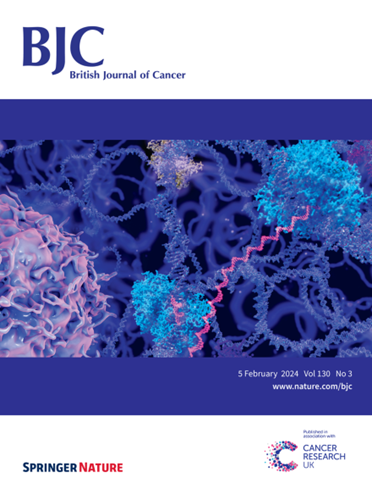SKP2 inhibition activates tumor cell-intrinsic immunity by inducing DNA replication stress and genomic instability
IF 6.4
1区 医学
Q1 ONCOLOGY
引用次数: 0
Abstract
S-phase kinase-associated protein 2 (SKP2) is a typical oncogene aberrantly overexpressing in a variety of cancer types, but it remains elusive whether SKP2 regulates the antitumor immunity of triple-negative breast cancer. The efficacy of anti-PD-1 was evaluated in the orthotopic xenografts of immunocompetent mice models. The infiltration of cytotoxic T cells in tumor microenvironment(TME) were assessed by immunofluorescence staining. The levels of pro-inflammatory chemokines were analyzed by ELISA. The protein interaction was analyzed by co-immunoprecipitation and GST pull-down. The genomic instability was analyzed by fluorescent microscopy. SKP2 inhibition significantly improved the antitumor efficacy of immune checkpoint blockade (ICB). Furthermore, SKP2 inhibition activated the cGAS/STING signal pathway and induced the secretion of pro-inflammatory chemokines, thereby promoting cytotoxic T cell infiltration. Additionally, we identified CDC6, a DNA replication licensing factor as a novel substrate of SKP2 in addition to CDT1. SKP2 induced protein degradation of CDC6 and CDT1 through the ubiquitin-proteasome pathway. Conversely, SKP2 inhibition elevated CDC6 and CDT1 protein levels, which caused DNA aberrant replication, DNA damage and genomic instability, thereby resulting in the accumulation of cytosolic DNA, activating cGAS/STING signaling pathway and improving antitumor immunity. SKP2 may be used as an effective therapeutic target to enable ICB antitumor immunotherapy. Peng et al. found that SKP2 inhibition improved the antitumor immunotherapy by activating tumor cell-intrinsic immunity, thereby providing evidences that SKP2 may be used as an effective therapeutic target to enable ICB antitumor immunotherapy.

抑制 SKP2 可通过诱导 DNA 复制应激和基因组不稳定性激活肿瘤细胞内在免疫。
背景:S期激酶相关蛋白2(SKP2)是一种在多种癌症类型中异常过表达的典型癌基因,但SKP2是否调控三阴性乳腺癌的抗肿瘤免疫仍是一个未知数:方法:在免疫功能正常的小鼠模型的正位异种移植中评估了抗 PD-1 的疗效。免疫荧光染色法评估了肿瘤微环境(TME)中细胞毒性T细胞的浸润情况。用酶联免疫吸附法分析促炎趋化因子的水平。通过共免共沉淀和 GST pull-down 方法分析了蛋白质相互作用。荧光显微镜分析了基因组的不稳定性:结果:抑制SKP2能明显提高免疫检查点阻断疗法(ICB)的抗肿瘤效果。此外,SKP2抑制可激活cGAS/STING信号通路,诱导促炎趋化因子的分泌,从而促进细胞毒性T细胞的浸润。此外,除 CDT1 外,我们还发现 DNA 复制许可因子 CDC6 也是 SKP2 的新型底物。SKP2 通过泛素蛋白酶体途径诱导 CDC6 和 CDT1 蛋白降解。相反,抑制SKP2会升高CDC6和CDT1蛋白水平,引起DNA异常复制、DNA损伤和基因组不稳定,从而导致细胞膜DNA积累,激活cGAS/STING信号通路,提高抗肿瘤免疫力:SKP2可作为有效的治疗靶点,实现ICB抗肿瘤免疫治疗:Peng等发现抑制SKP2可通过激活肿瘤细胞内在免疫改善抗肿瘤免疫治疗,从而为SKP2可作为有效治疗靶点实现ICB抗肿瘤免疫治疗提供了证据。
本文章由计算机程序翻译,如有差异,请以英文原文为准。
求助全文
约1分钟内获得全文
求助全文
来源期刊

British Journal of Cancer
医学-肿瘤学
CiteScore
15.10
自引率
1.10%
发文量
383
审稿时长
6 months
期刊介绍:
The British Journal of Cancer is one of the most-cited general cancer journals, publishing significant advances in translational and clinical cancer research.It also publishes high-quality reviews and thought-provoking comment on all aspects of cancer prevention,diagnosis and treatment.
 求助内容:
求助内容: 应助结果提醒方式:
应助结果提醒方式:


